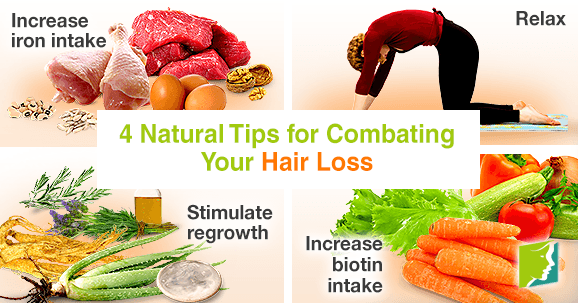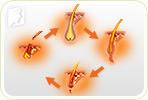Hair loss is an understandably distressing symptom of menopause. Today's society places great value on healthy hair in expressing femininity and physical beauty, so when hair becomes patchy, thin, or brittle during perimenopause, this can severely undermine a woman's confidence and sense of self-worth. While real beauty comes from within, it can be difficult to feel good about yourself if you're self-conscious about your image. As of yet, no medicinal “cure” exists for hair loss, but luckily, there are natural solutions.
Increase Iron Intake
The primary function of iron is to carry oxygen in the bloodstream for healthy red blood cells and blood circulation. Consuming more iron - found in certain fish, nuts, beans, and poultry - could help increase circulation and thereby oxygen supply to the scalp. Enjoy a glass of citrus juice with your iron sources, as vitamin C ups iron absorption in the body.
Relax
Stress can also exacerbate hair loss, so looking for ways to relax may be useful in minimizing this symptom. Each woman is different, but many enjoy yoga classes, meditation, or running. Consider arranging regular aromatherapy head massages. These are not only an excellent way to relieve stress - using specific hair-nurturing essential oils, such as lavender and rosemary, may also help stimulate hair regrowth.
Stimulate Regrowth
Using specific medicinal herbs may be useful in nourishing existing hair and stimulating blood circulation and activity in the scalp. Infusing dried herbs with water to make medicinal teas can help achieve this effect, but applying properly-diluted essential oils directly to the scalp will help counteract hair loss more directly.
Aloe vera is an herb often used in hair and skin treatments due to its considerable antioxidant properties. The gel from the leaves contains significant amounts of vitamin E for hydrating and nourishing the scalp to promote natural hair regrowth. You can also apply aloe to existing hair to improve its condition and add shine. Ginseng enhances blood circulation, lavender essential oil helps stimulate the hair follicles, and rosemary has anti-androgenic functions to help fight female pattern baldness during menopause.
Increase Biotin Intake
Biotin is a nutrient that has been linked to hair growth. If you have a biotin deficiency, increase your intake of the nutrient by incorporating more lettuce, chard, carrots, and tomatoes into your diet. A supplement could also help.
Physical attributes shouldn't define confidence, but it can be hard to adopt this mindset when hair loss is getting you down. Combating the symptom with positive, natural treatments will help, and in the meantime, look to improve your confidence in other ways. Learn a new skill, start working out, or accentuate another great part of your body with new clothes or makeup - whatever makes you feel good about yourself.
Sources
- Bhat, G. , Kudva, P. & Dodwad, V. (2011). Aloe vera: Nature's soothing healer to periodontal disease. Journal of Indian Society of Periodontology, 15(3), 205-209. doi: 10.4103/0972-124X.85661
- Dinh, Q.Q. and Sinclair, R. (2007). Female pattern hair loss: Current treatment concepts. Clinical Interventions in Aging, 2(2), 189-199. Retrieved from http://www.ncbi.nlm.nih.gov/pmc/articles/PMC2684510/
- McKinley Health Center. (2010). Dietary Sources of Iron. Retrieved June 26, 2014, from http://www.mckinley.illinois.edu/handouts/dietary_sources_iron.html
- Murata, K. et al. (2013). Promotion of hair growth by Rosmarinus officinalis leaf extract. Phytotherapy research, 27(2), 212-217. doi: 10.1002/ptr.4712
- National Center for Complementary and Alternative Medicine. (2012). Lavender. Retrieved June 25, 2014, fromhttp://nccam.nih.gov/health/lavender/ataglance.htm
- National Health Service UK. (2013). Hair loss - Treatment. Retrieved June 26, 2014, from http://www.nhs.uk/Conditions/Hair-loss/Pages/Treatment.aspx




